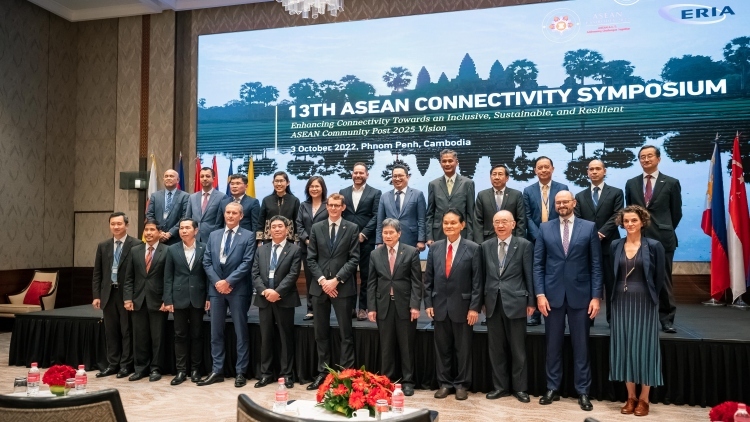Vietnam attends meetings on ASEAN connectivity
VOV.VN - Ambassador Nguyen Hai Bang, head of the Vietnamese Delegation to ASEAN, attended a series of meetings from October 1 to October 4 on the ASEAN connectivity in Phnom Penh, Cambodia.

These events include the third meeting of the ASEAN Connectivity Coordinating Committee (ACCC), a dialogue between the ACCC with the Lead Implementing Body for Sustainable Infrastructure (“LIB-SI”), and the fifth Monitoring, Review and Evaluation (MRE) Meeting for the Master Plan on ASEAN Connectivity (MPAC) 2025. This is along with the 13th ASEAN Connectivity Forum and the consultation meeting of ACCC with dialogue partners and other partners.
At the third ACCC meeting held this year, countries highly appreciated the positive progress made in the implementation of MPAC 2025. The meeting primarily focused on discussing ways in which to increase the efficiency of carrying out projects within the MPAC 2025 framework in the future, provide comments on the draft of the fourth MPAC 2025 Progress Assessment Report for further completion and submission to the 31st ASEAN Coordinating Council (ACC) which is slated for November.
Currently, the bloc has implemented 14 out of 15 initiatives in five strategic areas of the MPAC 2025, including sustainable infrastructure, digital innovation, inter-connected logistics, planning optimisation, and people mobility.
At the dialogue held between the ACCC and LIB-SI, the two sides discussed various challenges in carrying out projects in the strategic field of sustainable infrastructure and solutions moving forward.

The fifth meeting of the MRE MPAC 2025 saw the participation of representatives of specialised agencies assigned to lead the implementation of 15 initiatives within the framework of MPAC 2025. This includes the ASEAN Senior Transport Officials Meeting (STOM), the ASEAN Senior Economic Officials Meeting (SEOM), the ASEAN Senior Official Meeting on Education (SOM-ED), the ASEAN Senior Labour Meeting (SLOM), the Lead Implementing Body for Sustainable Infrastructure (“LIB-SI”), as well as ACCC members.
With the cross-sectoral and cross-pillar nature of connectivity projects, the MRE mechanism serves to create greater cohesion among implementing agencies, while simultaneously increasing awareness of shared responsibility in implementing MPAC 2025 initiatives and projects. It also offers parties a chance to discuss and find solutions to challenges and difficulties faced in the implementation of MPAC 2025.
At the ACCC's consultation meeting held alongside dialogue partners and other partners, ambassadors, and heads of delegations of many ASEAN partner countries, including the United States, China, Japan, the Republic of Korea (RoK), Australia, Germany, the UK, Canada, and New Zealand, participants hailed recent ASEAN efforts. They praised the bloc for promoting intra-regional connectivity as well as connectivity with the wider region.
Partner countries affirmed their strong determination to continue to support ASEAN in implementing projects within the framework of MPAC 2025, as well as boosting connectivity in general to strengthen cohesion in building the ASEAN community. This is along with improving cohesion between the bloc and its partners and supporting regional economic recovery and development.
This year's 13th ASEAN Connectivity Symposium running the theme" Enhancing connectivity towards an inclusive, sustainable and resilient ASEAN community post-20215 vision" attracted more than 150 delegates, including Cambodian Deputy Prime Minister and Minister of Foreign Affairs and International Cooperation Prak Sokhonn, ASEAN Secretary-General Dato Lim Jock Hoi, and Hidetoshi Nishimura, director of the Economic Research Institute for ASEAN and East Asia (ERIA). They were joined by numerous ambassadors and heads of delegations of ASEAN member states and ASEAN dialogue partners, development partners, as well as representatives from international organisations, the private sector, and other delegates.
During the three discussion sessions, the delegates shared information, knowledge, and specialised experience on the post-2025 ASEAN connectivity vision to promote partnership and linkages aimed at implementing MPAC 2025 projects, building sustainable infrastructure, and digitisation in order to enhance connectivity.

